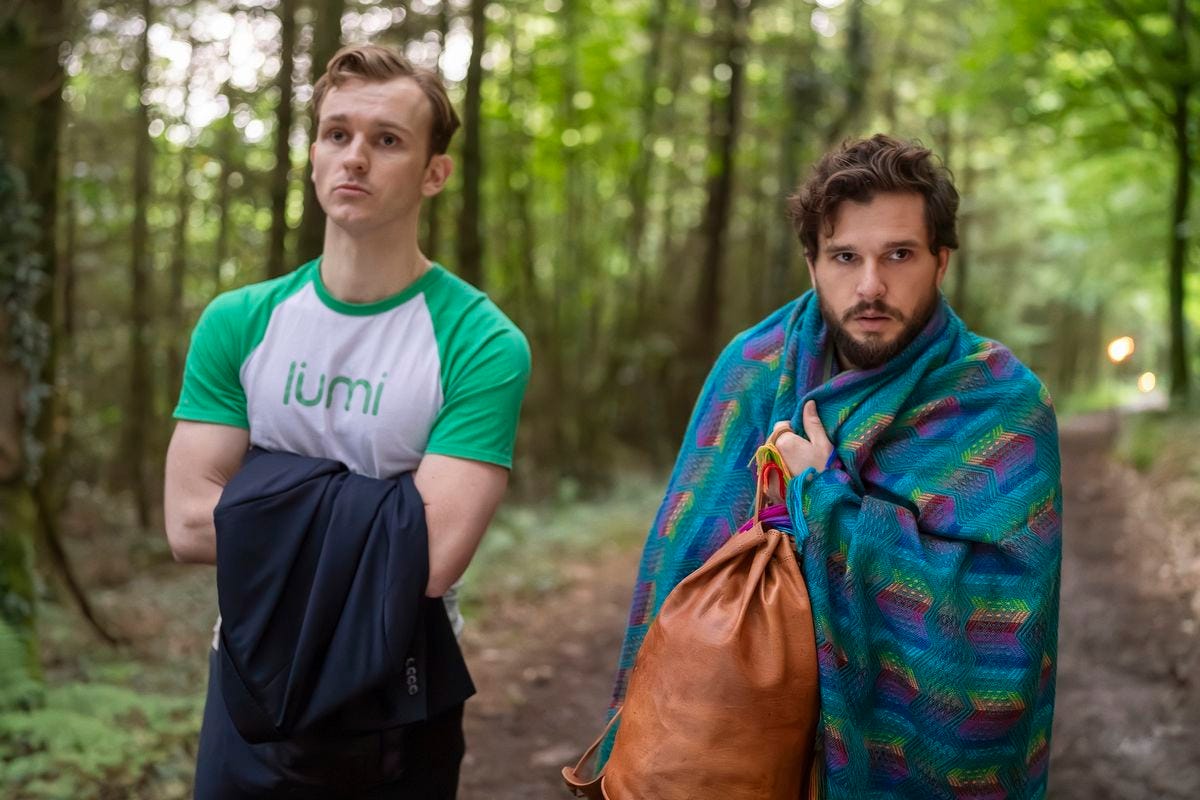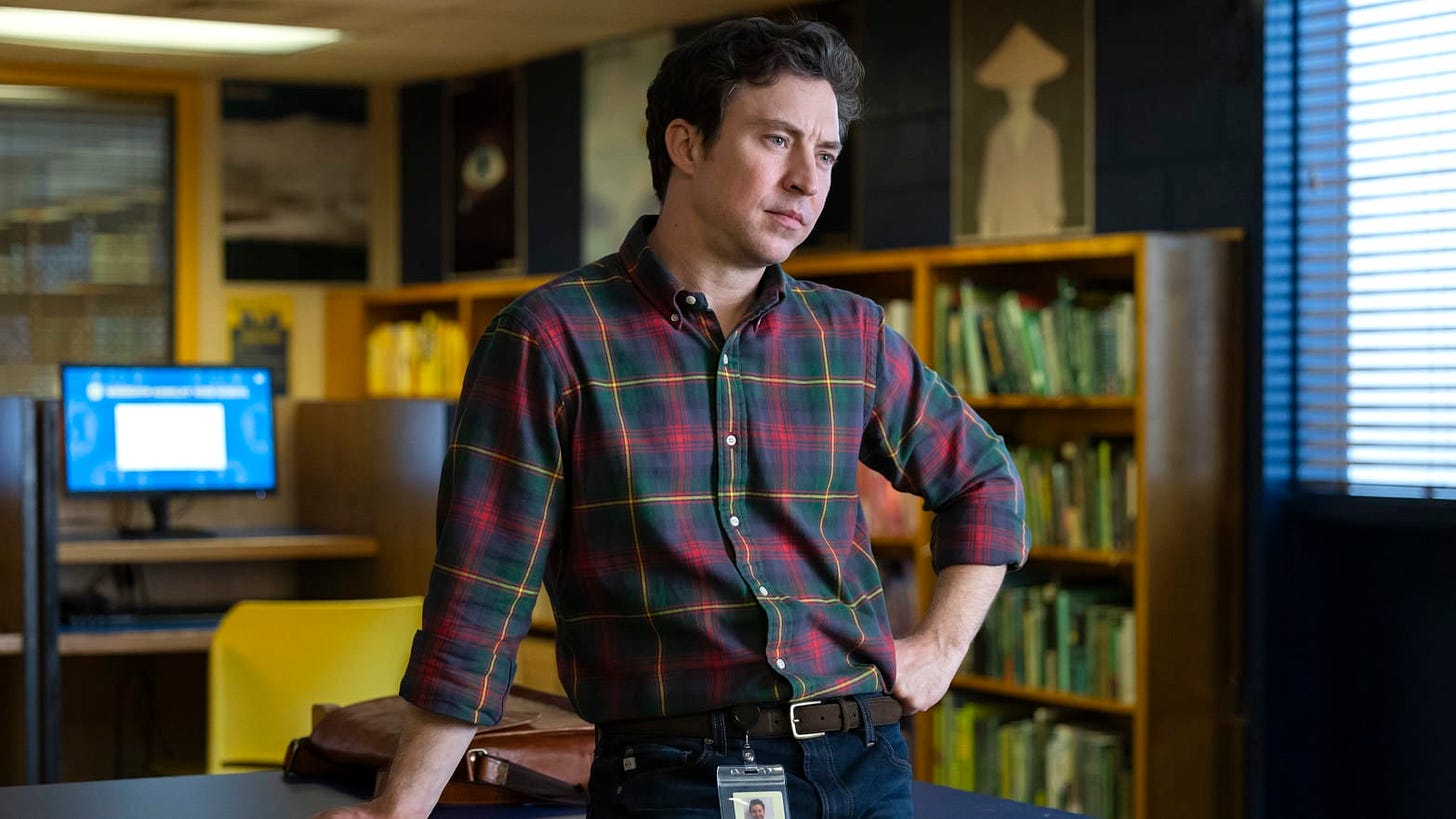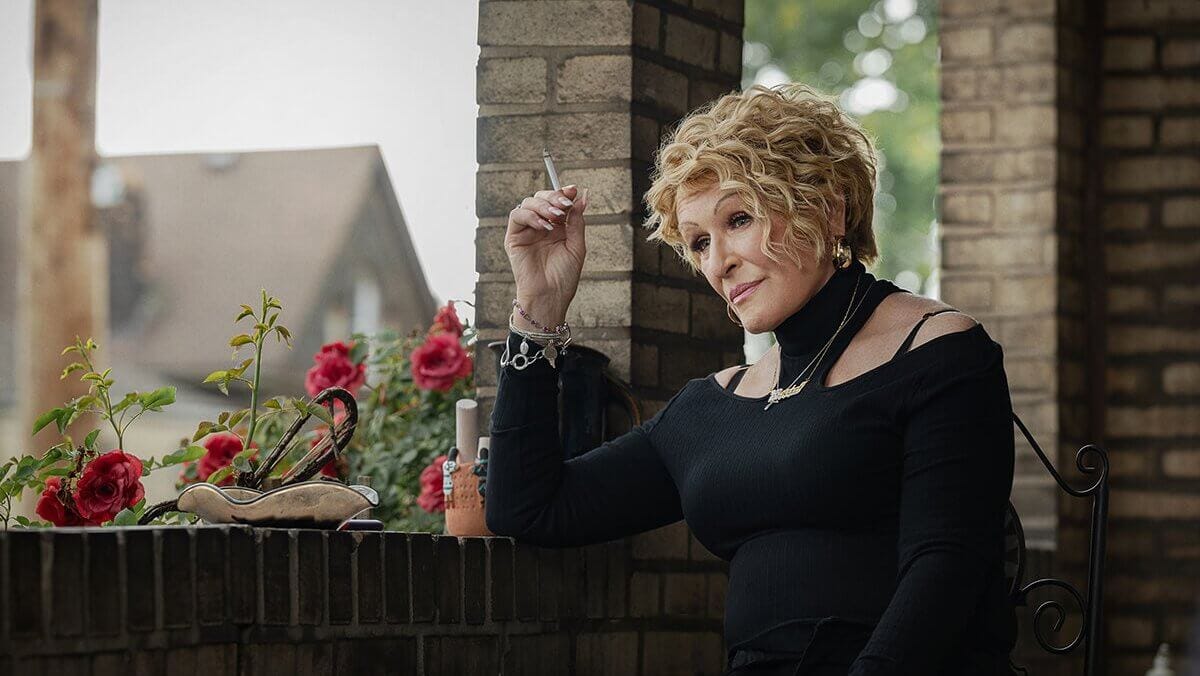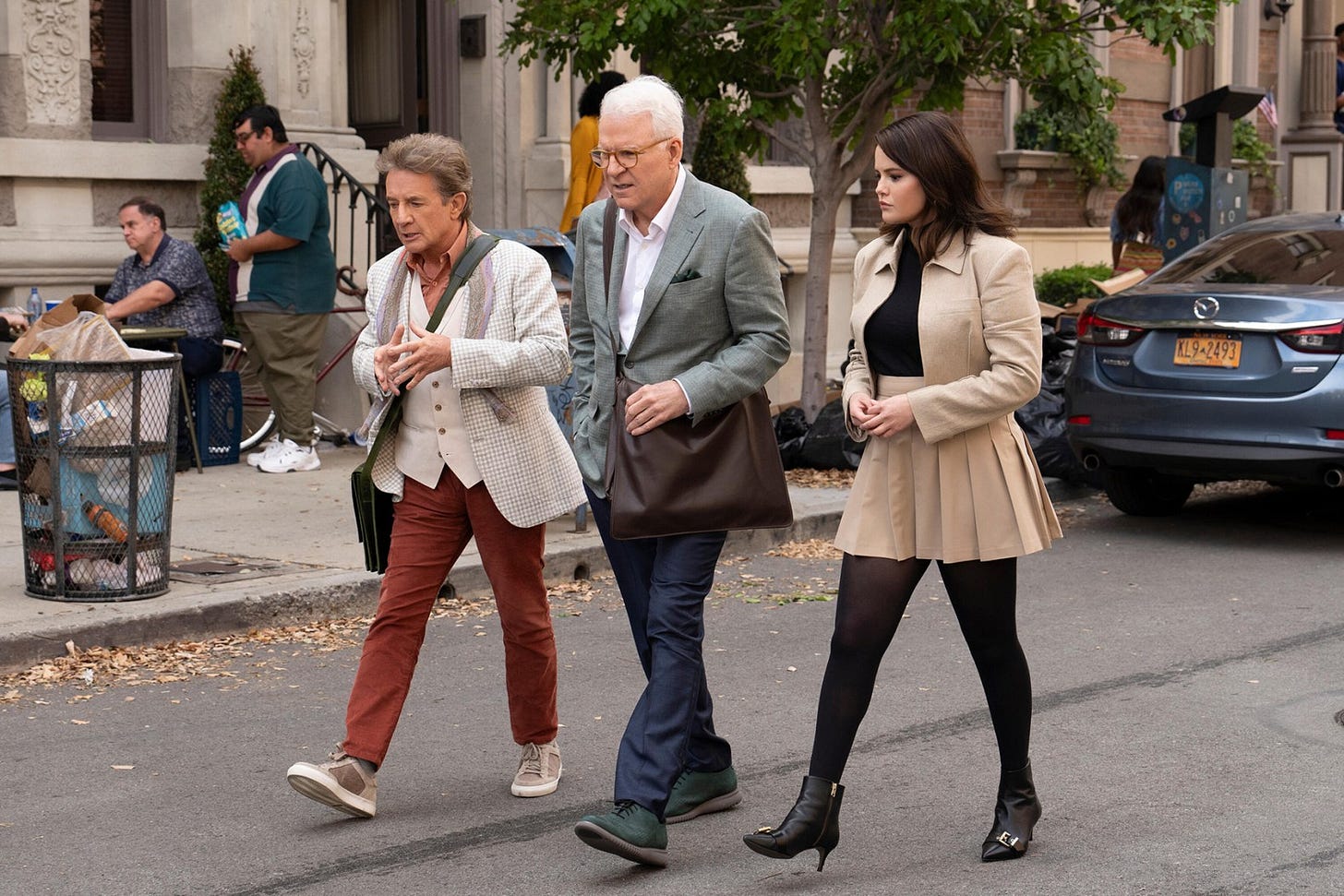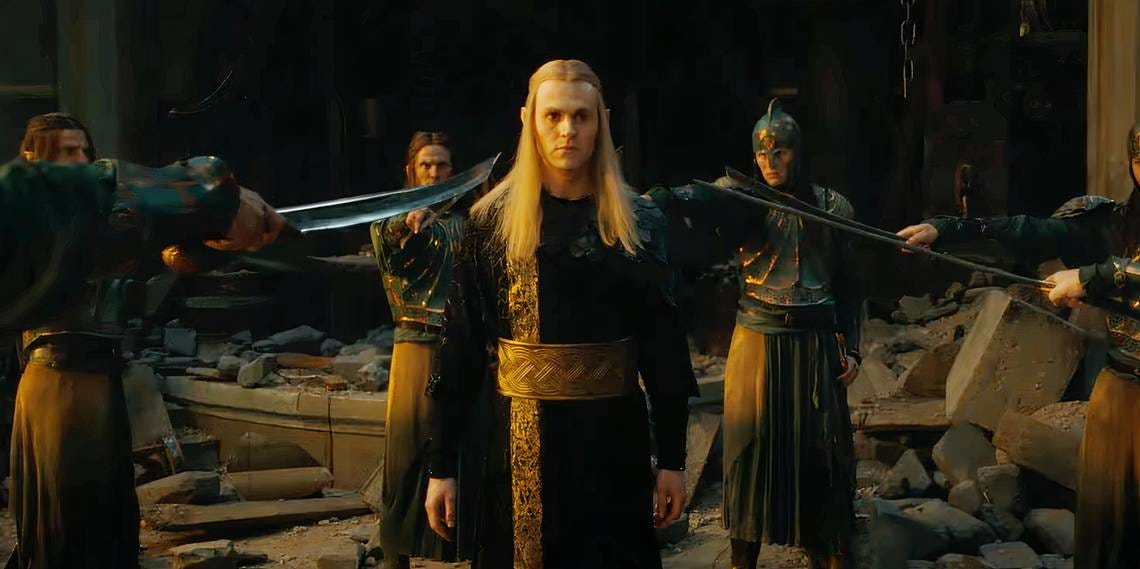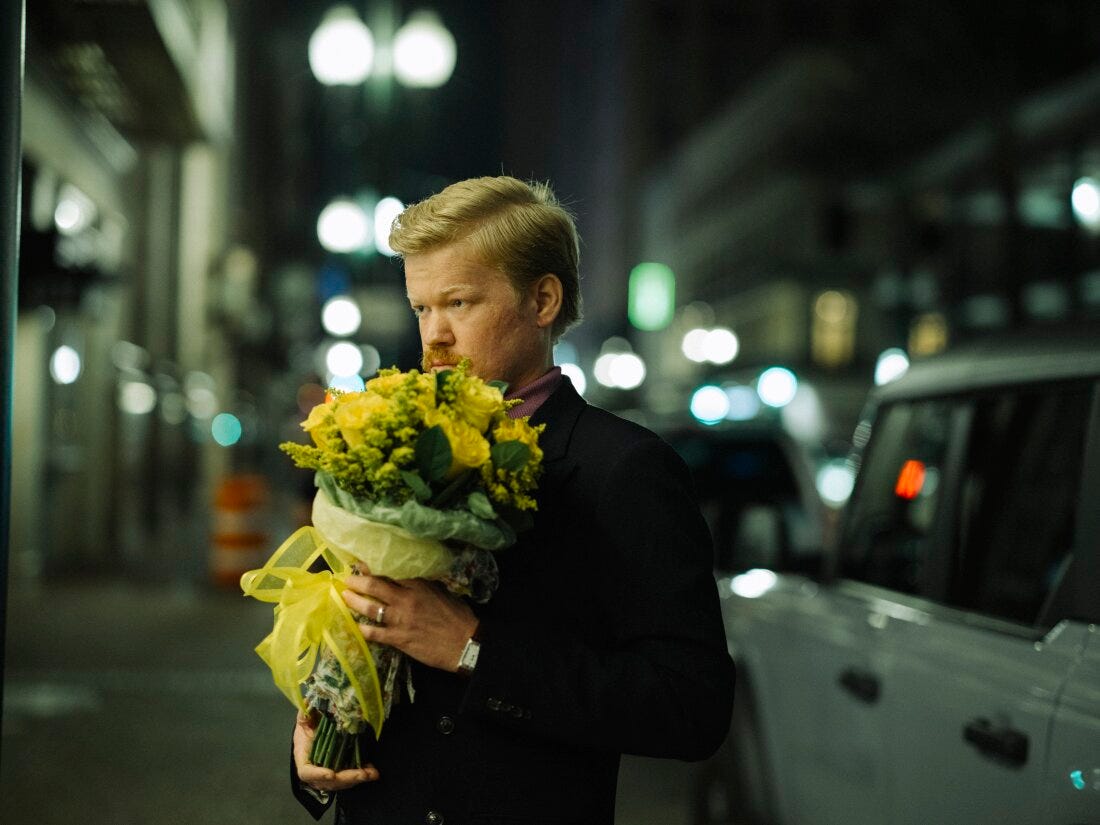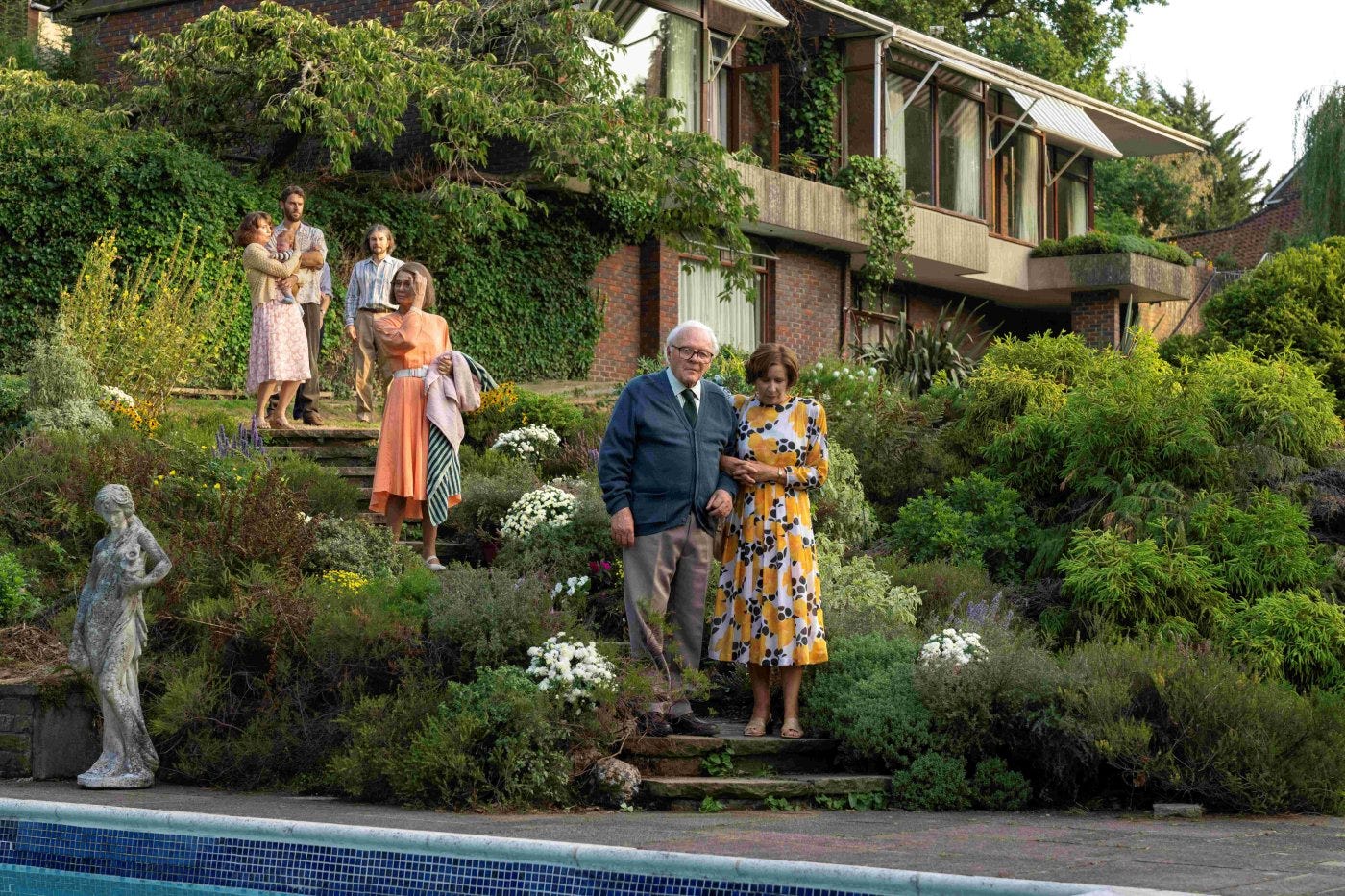How was the end of your summer, readers? Did you manage to jar all the joy the summer’s heat allows, so you can savor some preserves over the long winter?
At least for us here the winter represents a time of abundance; the year of television recently celebrated its conclusion with a fairly memorable 76th Primetime Emmy Awards, reïfying (at last in agreement with us!) that Hacks (Aniello, Downs, & Statsky [creators], 2021-present; see my take on the most recent season here) is clearly a more outstanding comedy series than The Bear (Storer [creator], 2022-present) really could ever be thought to be (see my take on its most recent season here) and honoring our pick Shōgun (Kondo & Marks [creators], 2024; see my take here) with a record-setting number of trophies, and the year in film is just heating up, with prime releases fresh in theaters in hopes of making it big this awards season
— all of which makes it the perfect time to stop and reflect on some of the best offerings we’ve received during the last lights of summer. So, cups up, readers; we’re pouring financial drama, true crime comedy, and horror paean to the divine feminine(?) among others. Enjoy!
Industry (Season 3)
Max • Drama • Jugular
Synopsis
Employees at the London branch of an American finance company each vie to make a difference in the narrow worlds they can see.
My take
Perhaps it’s because I grew up in New York City, on the periphery of the financial exchanges where tempers trade more barbs than bonds in this series, that Industry remains my current favorite drama series across all channels and platforms. Yes, readers, you read that correctly: The hyper-manicured, professional and personal environments setting the drama in Industry are somehow exquisitely to my taste (which, I have no trouble with admitting, is often for tech.-powered minimalistic finery, an admission that is no doubt a striking confession for all of you who know me — and look at me making confessions to you all not two sentences in, readers. Do you see how I trust you?). O, and, yes, there remains something additional and profound beyond merely a favored setting in my acclaim of this series; what keeps me so happily attuned to it over its now three seasons is nothing less foundational and important than its writing. Undeniably like the broadly acclaimed writing on the much more popular Succession (Armstrong [creator], 2018-2023) but in my opinion irrefutably ‘realer,’ Mickey Down and Konrad Kay’s continued work on Industry smarts with all the contrived language and affectations of the brokerages that locate the series in a specific time and place WITHOUT simultaneously aborting to abject sterility the taut psychological drama that the writers purposefully layer across those manners in order to push their characters ever farther along palpably misbegotten paths. The mix is keenly entrenched, brilliant television, the kind of which I am always ‘here for.’
Although it’s true, my preferences for the series did change after the distinct narrative shift Industry made between its first and second seasons, I can see now that the reset table has let Down, Kay, and the rest of their writing team deliver an ultimately even higher-quality product. If you’ll allow me the trite comment, perhaps like the woman meant to abide by Coco Chanel’s perennially requoted instruction they’ve done themselves the honor of paring things down in order to raise them up. While keeping a central focus on the four central characters (Harper, Yasmin, Eric, and Robert) did shed some storylines I had rather liked, the trimming did leave a tighter crisper sharper investigation of the edges and ridges that ultimately cache the series’ value:
Harper’s insatiable quest for self-redemption through power,
Yas’ undying belief that others will see how her brains match her beauty (and love her for it),
Eric’s deliberate handle on “fairness” as an indulgence bought with gritted teeth against the cuthroat survivalism he tells himself he’s compelled to practice, and
Robert’s shattered parentage as the reason he’s so often down on all fours mending the pieces of others’ haphazard actions (rather than letting himself be washed away into abject failure — as if those were the only two choices).
Put straight, they’re all fighters, readers, fighters in the peculiarly modern but recognizably timeless way that has allowed, for example, Faye Dunaway’s acute Diana Christensen to stay so powerful and familiar over the past nearly fifty years since she played her in Network (Lumet [dir.] & Chayefsky [wri.], 1976) or — more recognizably? — Bryan Cranston’s once disenfranchised Walter White to stay so tragic and true for his crushingly egoïstic, hard-boiled ambition in Breaking Bad (Gilligan [creator], 2008-2013). Theirs are rough human stories, the sort of “rough human” that actually delivers on the otherwise typically offhand and superficial remark “warts and all” with the lived-in, wrinkled, occasionally weeping transparency of curtains truly drawn back and eyes fully open — and not the stylized fantasist’s version of that person either, the likes of which (e.g., Velma Kelly; Chicago, Kander & Ebb, 1975) skim or glamorize away the pain of it from public viewing. No, despite the evident glamour of their surroundings, the substance of the characters on Industry remains the same corrosive interpersonal drama we’ve already upheld elsewhere it’s already appeared on screen in our culture: the risks taken and costs incurred when individual attainment butts heads with social, even intrafamilial interconnection. Perhaps it has been the hard, unfiltered lens on this substance that Industry has made its signature perspective — think, as insufficient shorthand, Steve McQueen (dir.) and Abi Morgan’s (wri.; 2011) Shame meets J. C. Chandor’s (2011) Margin Call — that has kept that same popular approval more away than at home with Industry than with other series; starkness is understandably not immediately comfortable for many, who at a glance have dismissed and will continue to dismiss the series and the insider’s lexicon it cultivates before really understanding the successes it very much does have. But that frankness betrays a sincere commitment to unreserved, unrestricted dramatic television that I’d be seriously remiss to not recommend perhaps especially to those most hesitant to watch and keep watching.
Is the series perfect? Certainly not. Chiefly, it could and should do more to grow its actors, who in my opinion consistently need more sensitive directions than they’ve apparently been given, in order to fully register the nuanced potential of the crushing weight their characters must carry. But this detraction is minor in comparison with the coherent ensemble opus Industry becomes over time, especially as an in situ portrait of our extremely recent past.
Temperature check
Steaming
English Teacher (Series Premiere)
Hulu / FX • Comedy • Millennial Core
Synopsis
A gay thirty-something high-school English teacher outside Austin, TX, finds it an intractable expectation, to leave his personal life outside his workplace.
My take
Though I never personally appreciated Brian Jordan Alvarez’ previous attempts at comedic lift-off before this point — in truth, perhaps only CollegeHumor’s (2012) short “Gay Men Will Marry Your Girlfriends” and his (2015) YouTube video “What actually happens when gay guys see other gay guys and straight people aren't around” left unflinchingly positive impressions — I’m glad now that the ever-increasingly mainstream position he’s occupied since those approximately decade-old shorts has given him the opportunity to create and lead this altogether exciting new comedy series on FX. Disarmingly sharp, with the bitter wit of lived humor well-observed, English Teacher is the home-run I think Alvarez has been hunting for over the past ten years: the platform to display his incisive criticisms of social dynamics at the opposite extremes of the scale, from microäggressions to profound injustices, all within the manners-based political sphere of perhaps the most disenfranchised but potent members of our society — i.e., teachers — and without the over-the-top theatrics that other once similarly sharp social commentaries have required(?) him to perform for screen time {ahem, Will & Grace (Kohan & Mutchnik [creators], 2018-2020)}.
And how tremendous now too, for the network so widely revered for its flagship investments into the now Emmy-certified drama, Shōgun (Kondo & Marks [creators], 2024; see my take here), and the proximately monocultural The Bear (see my take on the most recent season here) to have taken on this new series! The implicit endorsement here is correct: English Teacher belongs in that good company — not yet as the hero series, centering culture, but already as the very worthwhile support.
So, while it may feel easy and even ‘right’ to ignore what appears to be yet another show about teachers in the wake of the nearly monocultural (but obviously hammy) Abbott Elementary (Brunson [creator], 2021-present) — not to mention the long legacy of television series set in schools, especially high schools of all places (from Peyton Place [Monash (dev.), 1964-1969] through Buffy the Vampire Slayer [Whedon (creator), 1997-2003] to the reboot of Gossip Girl [Safran (dev.), 2021-2023]) — English Teacher makes the setting refreshingly its own, shedding the copycat heuristics of the mockumentarian and embracing instead a frothy diegetic commentary to an audience already privy to its subjects. From what I’ve seen, readers, this is the best new comedy series this year.
Temperature check
Hot
The Deliverance (2024)
Netflix • Horror • Heritable Grief
Synopsis
A single working mother guards her three children against the phantom pressures that threaten their lives in their new home in Pittsburgh, PA.
My take
Lee Daniels’ focus on the contemporary Black American experience has earned him both applause and critique over the past fifteen years. Precious (2009) remains the centerpiece on his mantle; a sobering if honest inspection of cultural, social, and personal disenfranchisement with two strong central performances, the film earned the producer and director two Academy Award nominations atop a slew of other industry awards and recognitions. This centerpiece, however, is flanked by two distinctly less applauded works: The Butler (2013) and The United States vs. Billie Holliday (2021; which completely paled in comparison with the immersed and insightful 2016 recording of Lonny Price’s Lady Day at Emerson’s Bar and Grill starring the one and only Audra McDonald). These later films were thin attempts at recreating the dramatic power of Precious and, if I may be so bold, at capitalizing commercially on not only Precious’ box-office success but also the box-office potential of the names of the real individuals on whom both films were based.
Now, with The Deliverance, it seems that Daniels may have seen the error of his recent ways, at least enough to know that trying again to recreate the success he enjoyed through Precious through yet another “gripping drama” may not be the right path forward for his career. Borrowing heavily from Friedkin and Blatty’s (1970) The Exorcist and Peele’s (2019) Us, here Daniels tries horror as his medium for a new investigation of expressions and experiences of caste, inheritance, and systemic power.
While the best parts of The Deliverance magnify the talents of its all-female adult cast, with scenes and monologues playing on the generational traumas and salves Daniels perhaps knows best, the foundation of the film (i.e., its screenplay) still manages on its own to ask competent questions about the sociocultural limitations on credibility and responsibility especially women often contend with in nurturing the next generation. Is the result of this investigation astounding? In absolute terms, no, it’s definitely not. We’ve seen many of these questions asked and explored before and elsewhere, in similar pieces like:
Alejandro Amenábar’s now classic (2001) The Others,
James Wan’s (2013-present) The Conjuring universe, and
Ryan Murphy and Ian Brennan’s impressive (2022) series Dahmer – Monster: The Jeffrey Dahmer Story
as well as in totally dissimilar pieces, like:
Eliza Hittman’s spare (2020) Never Rarely Sometimes Always;
Andy Tennant (dir./wri.), Susannah Grant, and Rick Parks’ (wri.; 1998) Ever After; and
even Tate Taylor’s (2011) The Help
and the pacing, lighting, and musical cues in The Deliverance fail to smack as hard they really should in order to achieve the high quality of work Daniels desired within this particular slice of the horror genre. However, is The Deliverance remarkable? Yes; yes, it is. Not just as an encouraging break from the depressing trajectory of Daniels’ most recent prior works and a significant turn toward a possibly new chapter in his career (a chapter I don’t see as necessarily remaining exclusively within horror), but also as an opportunity to focus on the talents of actors, The Deliverance makes for at least satisfactorily engaging film-going, substantiated by its intentional perspective on primarily working-class struggles to end cycles of harm and addiction through nearly any means necessary. The consonant cleaving to religion as either a palliating refuge or an activating center of real strength, however, is unfortunately just a red herring.
Temperature check
Tepid
Only Murders in the Building (Season 4 Premiere)
Hulu • Comedy • Hollywood Calling
Synopsis
Grassroots podcasters find budding celebrity life-threatening, once again quite close to home.
My take
It’s more than a bit bizarre, readers, how a series based on a nearly impossibly replicated premise has not just carried on for three seasons at this point but — at least as far as evident popular opinion goes — actually stridden proudly into a fourth this past month, on the heels of its own “personal best” count of twenty Primetime Emmy Award nominations (and four wins). I mean, really, four consecutive seasons of four consecutive murders just falling into the laps of three motley neighbors?! Television hasn’t strained credulity this much since Jessica Fletcher didn’t commit twelve seasons of murder while residing at her charming cottage in Cabot Cove, Maine (Murder, She Wrote, Fischer, Levinson, & Link [creators], 1984-1996); or, as Cher memorably comments in her Oscar-winning role in Moonstruck (Jewison [dir.] & Shanley [wri.], 1987), “This is modern times! There ain’t supposed to be miracles no more!”
And, although (as I surmise) the series has crafted itself into a sort of comforting comedic procedural for the senior members of the television-watching community (much as Murder, She Wrote in fact did), somehow — despite what I can confidently call the absolute worst performance from Paul Rudd I’ve ever seen — Only Murders in the Building nevertheless continues to strike rather than stifle genuine moments of laughter from me in each of its new fourth-season episodes. No, it’s not the painfully obvious set-up jokes I dignify with that mark of authentic quality; those jokes I could leave to the ‘80s sitcom laugh track they so tangibly accompany. Instead, it’s the sharp quips, that sting with the accomplished burn of seasoned comedians acing their timing, that keep me entertained; these ‘jokes’ are the violent lifeblood of any (non-absurdist’s) scripted comedy doing its utmost to alchemize keen observations into moments of transcendental clarity about the fun of knowing other people so well as to delight in all their myriad foibles.
If I could ask anything of the showrunners, writers, directors, and cast behind this now legacy series, it’s only that they keep those transcendental quips coming. Regardless of the show’s thinned premise, which in fairness the writers have carefully and subtly redirected this season to give the series a horizon line to head towards over the next two (maybe three) seasons before an ultimate finale, with quips like those I confess I’ve become — somewhat astoundingly — a fan.
Temperature check
Hot (just barely)
The Lord of the Rings: The Rings of Power (Season 2)
Amazon Prime • Drama • Setting All Things to Rights
Synopsis
Traditions wither as outstretched arms lose touch over great personal, circumstantial, and geographical divides.
My take
I’m not sure exactly what I had originally expected; but I suppose now, in retrospect, that the triumph of resilient human interconnection despite pressures to individuate gains as the working victory of Tolkien’s (1954-1955) The Lord of the Rings does predict the loss of that interconnection at the behest of interests in its failure as the working tragedy of The Lord of the Rings: The Rings of Power — or at least just this second season. Intentionally setting the stage that we as a viewing audience know all too well from Peter Jackson’s (2001-2003) milestone cinematic trilogy, The Rings of Power is the prequel series House of the Dragon (Condal & Martin [creators], 2022-present) in many ways wishes it had the genetics to be: an anticipation of a broad, genre-defining, and unfalteringly admired epic contest among rival factions in a quasi-medieval but fantastic gauntlet focussed on the determination of self-governance. However, as for all the children of great performers, whatever the sport or discipline, genetics are only part of the battle; and where The House of the Dragon has profitably invested its recent season into the hands and talents of its actors (see my take on that second season here), The Rings of Power has instead invested its second season into the paints and textures of its setting to variable success. Sure, perhaps with that investment the series can transform its premiere season’s three Emmy nominations specifically for visual effects (in costuming, make-up, and special effects) into one or more wins for the current season at next year’s ceremony; but will that investment also pay dividends to an audience likely more interested in the drama than the decoration of this story?
In my opinion, this second season of The Rings of Power remains only so sufficiently engaging that it saves itself from becoming a niche pastime for Tolkien fanatics craving ever more visual adaptations of their favorite lands and peoples. How the season chooses to explore its premise — i.e., via a swindler’s attacks on the vulnerabilities of undocumented absolutists’ governments (al be those governments genuinely for the good of the people) — does reveal a thoughtfulness a complete subscriber-grab would have easily foregone to save costs; but the elaboration of this thoughtfulness, especially across disparate plotlines that only an experienced familiarity with the events that canonically follow can effectively sew together, lacks the cogency the series really needs to make its point impactfully. Where is the synthesis? Where is the motion towards denouement? Hopefully in a third season, which I believe the series will likely receive, stronger editing and directing can mend the gaps in the writing and acting enough to better distill the true brandywine from this fermentation of politics and fantasy.
Temperature check
Tepid
Kinds of Kindness (2024)
Hulu / Disney+ • Drama • Boundaries
Synopsis
Three only loosely connected stories meditate on the extremes to which individuals will go in order to enjoy the benefits of another’s “kindness.”
My take
Jesse Plemons earned that Best Actor prize at this year’s Cannes Film Festival for delivering three fascinatingly sturdy, complex and removed characters in Yorgos Lanthimos’ fast-follow to his broadly lauded Poor Things (2023; see my take here). Were it not for the gravitational force Plemons provides across the three separate shorts that compose the full film, I don’t think the rest of the work would hang together with any stronger force or interest than any season of Ryan Murphy and Brad Falchuk’s (2021-present) anthology series American Horror Stories, which while provocatively intriguing in its episodic premises hasn’t yet delivered consistently enough on that intrigue to surprise, delight, and retain attention (see my take on the second season here). On the page, it’s really just the earliest of the three narratives in Kinds of Kindness, that ventures the film into tropes that either in essence or in angle felt at all fresh or new. While I ultimately admire Lanthimos’ continued push into the curious, the queer, and the vicious, I don’t think that in the long-view of his body of work Kinds of Kindness will stand out as more than a educational exercise of those interests, one I can only say thankfully centered around one strong leading performance.
Temperature check
Tepid
One Life (2023)
Paramount+ with Showtime • Drama • Saving History
Synopsis
Nearly 50 years later, a stock broker turned activist fights to preserve the memories of the young Jewish lives he and his associates strove to save in the earliest days of World War II.
My take
It’s sad that this quietly powerful film, which while trafficking in perhaps the most over-inspected historic period in cinematic history still does manage to capture a relatively under-acknowledged aspect of that period,1 was not better distinguished during its original theatrical run. Perhaps the primacy of the excellent The Zone of Interest (Glazer, 2023; see my take here) left relatively little public attention for a smaller and less operatic 2023 film about the horrors of the Holocaust, despite the film’s sensitive editing and solid central performances. While most members of the public may be familiar with the popular clip of the real Nicholas Winton’s celebration by an audience full of people whose lives he’d saved, the details of that saving and the true emotional toll of the work it required and the grim reality that the work addressed are not apparent from that clip alone, not by a long shot; the beauty of One Life is therefore in the air it gives to both that work and the legacy it left onto the people it affected, including Winton himself. Anthony Hopkins delivers a moving leading performance as the older Winton, reflecting on his past and attempting to ensure the memories of those he tried to help would not be forgotten; and Johnny Flynn, playing Hopkins’ younger counterpart, intelligently resists indulging sentimentality as Hopkins does, making not only the pair feel like two sides of the same coin but moreover strengthening the impact of the drama on the audience, whose members are not told what to feel and when to feel it but rather are pressed empathetically, like Winton and his associates, between the tensions of mounting grief and uncertain relief, into an authentically emotional state. Blessed with a simple but effective screenplay supporting that emotional effect and a director with an eye toward coherence enough to pull it all off, the film overall is a compelling visit into a unique silver lining around the tragedies of the Second World War, a visit that amid the darkness it must portray is still somehow in relatively equal measure both serious and reässuring.
Temperature check
Tepid
We recall only Spielberg (dir.) and Zaillian’s (wri.; 1993) Schindler’s List taking a similar angle.




